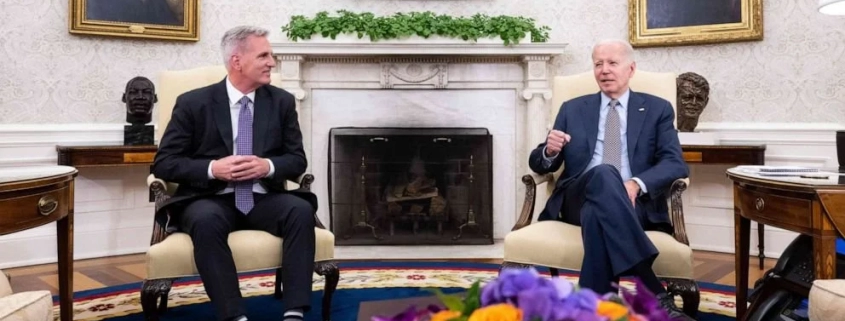Debt Ceiling Measure Would Restrict Agency Funding for 2024-2025, and Possibly Beyond
The debt ceiling measure that is up for voting in Congress would prevent an unprecedented national default although at the cost of limits on accounts in most federal agencies that fund federal employee salaries and other operating costs.
The impact could be felt as soon as the October 1 start of fiscal 2024, when funding for agencies other than the VA and Defense Department would essentially be capped at current levels, while increases that the White House sought for those two departments would be allowed. For fiscal 2025, total growth of only 1 percent would be allowed for the other agencies.
Afterward there would be a series of targets for limiting spending, although not with the same provisions for enforcement as for fiscal 2024 and 2025. There also would be procedural incentives for Congress to pass individual appropriations bills rather than tie all of them into one large year-end package as has been the pattern in recent years. Under the measure, if individual bills are not passed, new limits affecting both defense and non-defense accounts would kick in.
Such limits on agency “salaries and expenses” accounts often translate into pressure to hold down employment levels and in more serious cases can lead to unpaid furloughs—as occurred after an agreement in a similar debt ceiling showdown in 2011 resulted in funding caps—or even RIFs. The exact impact is unknowable at present, though, and is much less restrictive than a House-passed bill that would have set firm caps of only 1 percent annual growth over 10 years.
“A freeze in spending for federal agencies will lead to serious issues or make matters worse than they already are,” the NFFE union said. “Accounting for inflation, this deal ultimately means federal agencies will see their funding cut over the next two years. Republicans in Congress who are pushing for these cuts need to understand that this deal will only exacerbate issues with operations and staffing, and the American public will suffer the consequences, as will federal employees.”
Other spending restrictions include rescinding authority for some pandemic-related funding previously approved but unspent and cutting nearly $20 billion of the $80 billion in funding over 10 years approved last year for the IRS above baseline levels. However, administration officials said that would not necessarily change the agency’s short-run planning for the additional funding, which include beefing up enforcement and customer service and replacing outdated IT.
Other policy provisions include requiring agencies to find offsetting savings for the cost of certain regulatory actions; increasing the age for work requirements for certain safety net programs such as food stamps but also broadening some exceptions from those requirements; and speeding up the environmental impact process for certain projects.
Citation: FedWeek May 30, 2023



